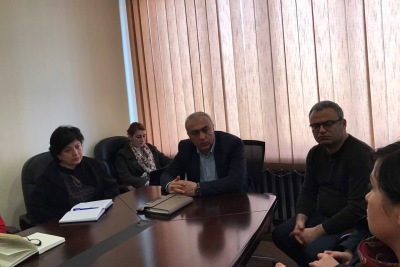Addressing the Needs and Priorities of Internally Displaced Women
Date:
The Ministry of Internally Displaced Persons from the Occupied Territories, Refugees and Accommodation (MRA) organized two meetings with local authorities and internally displaced women in western Georgia, to address their needs and priorities.

The Ministry meets with the Governor of Zugdidi and IDPs from the municipality to discuss concerns and priorities; Photo: UN Women
Nata Todua was displaced from Abkhazia in the 1990s. She lives in Kutaisi in the Imereti region of western Georgia. She came to a meeting with the Deputy Mayor of Kutaisi and the Head of the IDP Department of the MRA to bring challenges in her community to the attention of decision-makers:
There are many children in our settlement, who need to cross the road several times a day, but the traffic situation is not safe. We need a zebra crossing in our community. We also lack access to laundry facilities, which would make women’s work easier and free time for income-generating activities.
Addressing socio-economic needs of displaced women through participatory meetings between local authorities and citizens is one of the commitments of the MRA under the National Action Plan for Implementation of the UN Security Council Resolutions on Women, Peace and Security as well as its own Gender Equality Strategy and Action Plan. Concrete problems such as IDPs housing and living conditions, access to and quality of social services, or access to targeted state programmes and benefits are frequently discussed issues during these gatherings.
Similar meetings have been organized since 2016 with the technical support of UN Women as part of the project “Equal Access of IDPs to Economic Opportunities”, implemented by UN Women and the Food and Agriculture Organization of the United Nations (FAO) and funded by the European Union.
The project aims to improve the livelihoods of vulnerable IDPs and also provides co-funding for social investments initiated by community members in collaboration with local municipalities.
Ideas for such joint social infrastructure projects, as a mechanism to meet local needs, was a main topic of discussion at the second dialogue meeting, organized by the MRA together with the Governor of Zugdidi municipality and IDPs from the area. Lasha Gogia, Governor of Zugdidi, was very responsive to the needs and priorities identified by community members and expressed willingness to support community-led initiatives for social infrastructure development:
We will not only support community members’ initiatives to improve the conditions and access to services where they live, but also make contributions and if necessary engage other stakeholders to realize these development projects.